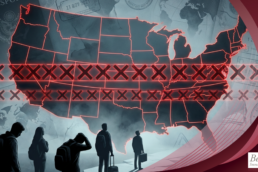On October 16, 2025, the Department of Homeland Security will begin enforcing a new immigration parole fee required by the H.R. 1 “One Big Beautiful Bill”. Under this policy, anyone paroled into the United States (or re-paroled) must pay a $1,000 fee, unless they qualify for one of ten statutory exceptions.
Here’s a clear breakdown of how this fee works, who it affects, and what you should do now.
What Is the Immigration Parole Fee?
The HR-1 legislation created a new requirement: when DHS grants someone parole into the U.S., whether at a port of entry or within the country, the individual must pay $1,000 (for FY 2025). That fee is in addition to any existing USCIS or CBP fees; it does not replace other immigration fees.
The share of the fee adjustable for inflation begins in FY 2026, based on the Consumer Price Index.
Importantly, you do not pay the parole fee when you submit Form I-131 (for parole documents or travel documents). The fee is assessed only after DHS preliminarily approves parole (or re-parole) and conditions the grant on payment.
When Does the Fee Take Effect & How It’s Collected
- Starting October 16, 2025, DHS will issue a notice via the Federal Register to begin enforcing this parole fee.
- If your request for parole or re-parole is approved and the fee applies, DHS will notify you with specific instructions, a deadline, and how to pay. Parole will not be granted until the fee is paid in full and on time.
- Customs and Border Protection, Immigration and Customs Enforcement, or USCIS may collect the parole fee depending on which agency grants the parole.
- If you fail to pay, your parole request will be denied and you lose the opportunity to obtain the parole status.
Who Must Pay and Who Is Exempt
Who Pays
The fee applies whenever someone is paroled into the U.S. under INA § 212(d)(5)(A), including:
- Initial parole at a port of entry
- Re-parole (renewal of parole)
- Parole in place
- Parole granted to someone already in U.S. custody
- Parole granted following a request while already in the U.S.
Who has an Exception (10 Total)
HR-1 lists 10 statutory exceptions. If you establish that your parole is justified under one of these categories, DHS may waive the fee. Some important exceptions include:
- You are a lawful adjustment of status applicant (INA § 245) re-entering under advance parole.
- You are paroled for medical emergency or you are the parent or guardian of such a person.
- A close family member in the U.S. is gravely ill, and you could not arrive in time by visa.
- You need to donate an organ and visa processing is too slow.
- You are a Cuban or Haitian entrant as defined by statute.
- You assist the U.S. in law enforcement or national security matters.
Even if you qualify under an exception, DHS has discretion to decide whether to accept it.
How This Affects Adjustment-of-Status Applicants
For many family- and employment-based applicants who never required parole to enter the United States, this new fee will likely not affect their primary path. But the wrinkle emerges if someone leaves the U.S. and plans to reenter using advance parole:
- Under HR-1, the statute expressly exempts lawful AOS applicants from this parole fee when reentering after temporary travel abroad.
- So if you depart and rely on advance parole, in most cases you should not owe the $1,000 fee, provided that DHS recognizes that exception.
- That said, you should not assume automatic waiver. Always confirm eligibility and document your status as an AOS applicant when requesting parole.
As Jennifer Behm Esq., Berardi Immigration Law Partner, puts it: “When new rules expand liability, knowing which carveouts apply is just as important as knowing the rule itself.”
What You Should Do Now
- Monitor DHS announcements around October 16, 2025, and review the final Federal Register notice for full details.
- If you are applying for parole or re-parole, assume the fee may apply. Budget for $1,000 unless you are confident an exception applies.
- If you qualify for an exception, submit evidence along with your request to improve your chances of waiver.
- Do not delay seeking legal advice. Because DHS retains discretion, advocacy matters, especially for exceptions and waiver requests.
At Berardi Immigration Law, we are already preparing to help clients navigate and plan around this new requirement even in the midst of uncertainty. As Jennifer Behm, Esq. reminds us: “Protecting lawful immigration means anticipating shifts, and acting decisively on day one.”
Frequently Asked Parole Fee Questions (FAQs)
Does this new parole fee apply to adjustment of status (AOS) applications filed within the U.S.?
No. The fee attaches only to parole, not to routine adjustment of status. If you never require parole to enter or remain in the U.S., you won’t face this cost.
If I already applied for parole before Oct. 16, 2025, do I still have to pay?
Yes, because the fee attaches when parole is effectuated (i.e., when DHS grants parole). If parole is granted on or after the effective date, the fee likely applies, even if your application was filed earlier.
Could DHS refuse to waive the fee even if I fall into an exception category?
Yes. The statute gives DHS discretion to grant or deny a waiver or exception, even if eligibility criteria are met. So, documentation and legal advocacy may be critical.
Stay Informed of Immigration Fee Changes
The new $1,000 immigration parole fee under HR-1 marks a significant shift in how discretionary parole is handled. It creates financial exposure for many individuals who may be seeking humanitarian parole, reentry, or parole in place, unless one of the limited exceptions applies.
At Berardi Immigration Law, our goal is to cut through confusion and help you plan proactively. We are monitoring DHS guidance, advising on exemption eligibility, and ready to act decisively when clients need us most. In times of shifting policy, trusted legal navigation matters.
If you anticipate needing parole or re-parole in the near future, or simply want to explore your options before this new regime takes hold, contact us for a consultation in person or online.
Ready to have Berardi on your side?
Whether you’re a business looking to hire or a professional hoping to relocate, immigration law can be complicated. But you don’t have to do it alone. Put our experience to work for you.



